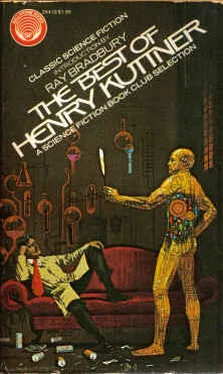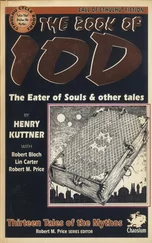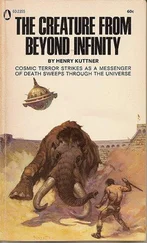It was simple, but the changes it produced were worldwide and all human life on the planet altered drastically because of it. The machines were an integrated society, if man was not. And now they had a single set of orders which all of them reorganized to obey.
So the days of the free luxuries ended. The Escape Machines shut up shop. Men were forced back into groups for the sake of survival. They had to undertake now the work the machines withheld, and slowly, slowly, common needs and common interests began to spawn the almost lost feeling of human unity again.
But it was so slow. And no machine could put back into man what he had lost-the internalized conscience. Individualism had reached its ultimate stage and there had been no deterrent to crime for a long while. Without family or clan relations, not even feud retaliation occurred. Conscience failed, since no man identified with any other.
The real job of the machines now was to rebuild in man a realistic superego to save him from extinction. A self-responsible society would be a genuinely interdependent one, the leader identifying with the group, and a realistically internalized conscience which would forbid and punish “sin”-the sin of injuring the group with which you identify.
And here the Furies came in.
The machines defined murder, under any circumstances, as the only human crime. This was accurate enough, since it is the only act which can irreplaceably destroy a unit of society.
The Furies couldn’t prevent crime. Punishment never cures the criminal. But it can prevent others from committing crime through simple fear, when they see punishment administered to others. The Furies were the symbol of punishment. They overtly stalked the streets on the heels of their condemned victims, the outward and visible sign that murder is always punished, and punished most publicly and terribly. They were very efficient. They were never wrong. Or at least, in theory they were never wrong, and considering the enormous quantities of information stored by now in the analog computers, it seemed likely that the justice of the machines was far more efficient than that of humans could be.
Some day man would rediscover sin. Without it he had come near to perishing entirely. With it, he might resume his authority over himself and the race of mechanized servants who were helping him to restore his species. But until that day, the Furies would have to stalk the streets, man’s conscience in metal guise, imposed by the machines man created a long time ago.
What Danner did during this time he scarcely knew. He thought a great deal of the old days when the Escape Machines still worked, before the machines rationed luxuries. He thought of this sullenly and with resentment, for he could see no point at all in the experiment mankind was embarked on. He had liked it better in the old days. And there were no Furies then, either.
He drank a good deal. Once he emptied his pockets into the hat of a legless beggar, because the man like himself was set apart from society by something new and terrible. For Danner it was the Fury. For the beggar it was life itself. Thirty years ago he would have lived or died unheeded, tended only by machines. That a beggar could survive at all, by begging, must be a sign that society was beginning to feel twinges of awakened fellow feeling with its members, but to Danner that meant nothing. He wouldn’t be around long enough to know how the story came out.
He wanted to talk to the beggar, though the man tried to wheel himself away on his little platform.
“Listen,” Danner said urgently, following, searching his pockets. “I want to tell you. It doesn’t feel the way you think it would. It feels—”
He was quite drunk that night, and he followed the beggar until the man threw the money back at him and thrust himself away rapidly on his wheeled platform, while Danner leaned against a building and tried to believe in its solidity. But only the shadow of the Fury, falling across him from the street lamp, was real.
Later that night, somewhere in the dark, he attacked the Fury. He seemed to remember finding a length of pipe somewhere, and he struck showers of sparks from the great, impervious shoulders above him. Then he ran, doubling and twisting up alleys, and in the end he hid in a dark doorway, waiting, until the steady footsteps resounded through the night.
He fell asleep, exhausted.
It was the next day that he finally reached Hartz.
“What went wrong?” Danner asked. In the past week he had changed a good deal. His face was taking on, in its impassivity, an odd resemblance to the metal mask of the robot.
Hartz struck the desk edge a nervous blow, grimacing when he hurt his hand. The room seemed to be vibrating not with the pulse of the machines below but with his own tense energy.
“Something went wrong,” he said. “I don’t know yet. I—”
“You don’t know!” Danner lost part of his impassivity.
“Now wait.” Hartz made soothing motions with his hands. “Just hang on a little longer. It’ll be all right. You can—”
“How much longer have I got?” Danner asked. He looked over his shoulder at the tall Fury standing behind him, as if he were really asking the question of it, not Hartz. There was a feeling, somehow, about the way he said it that made you think he must have asked that question many times, looking up into the blank steel face, and would go on asking hopelessly until the answer came at last. But not in words…
“I can’t even find that out,” Hartz said. “Damn it, Danner, this was a risk. You knew that.”
“You said you could control the computer. I saw you do it. I want to know why you didn’t do what you promised.”
“Something went wrong, I tell you. It should have worked. The minute this-business-came up I fed in the data that should have protected you.”
“But what happened?”
Hartz got up and began to pace the resilient flooring. “I just don’t know. We don’t understand the potentiality of the machines, that’s all. I thought I could do it. But—”
“You thought!”
“I know I can do it. I’m still trying. I’m trying everything. After all, this is important to me, too. I’m working as fast as I can. That’s why I couldn’t see you before. I’m certain I can do it, if I can work this out my own way. Damn it, Danner, it’s complex. And it’s not like juggling a comptometer. Look at those things out there.”
Danner didn’t bother to look.
“You’d better do it,” he said. “That’s all.”
Hartz said furiously. “Don’t threaten me! Let me alone and I’ll work it out. But don’t threaten me.”
“You’re in this too,” Danner said.
Hartz went back to his desk and sat down on the edge of it.
“How?” he asked.
“O’Reilly’s dead. You paid me to kill him.”
Hartz shrugged. “The Fury knows that,” he said. “The computers know it. And it doesn’t matter a damn bit. Your hand pulled the trigger, not mine.”
“We’re both guilty. If I suffer for it, you—”
“Now wait a minute. Get this straight. I thought you knew it. It’s a basis of law enforcement, and always has been. Nobody’s punished for intention. Only for actions. I’m no more responsible for O’Reilly’s death than the gun you used on him.”
“But you lied to me! You tricked me! I’ll—”
“You’ll do as I say, if you want to save yourself. I didn’t trick you, I just made a mistake. Give me time and I’ll retrieve it.”
“How long?”
This time both men looked at the Fury. It stood impassive.
“I don’t know how long,” Danner answered his own question. “You say you don’t. Nobody even knows how he’ll kill me, when the time comes. I’ve been reading everything that’s available to the public about this. Is it true that the method varies, just to keep people like me on tenterhooks? And the time allowed-doesn’t that vary too?”
Читать дальше







